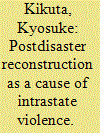|
|
|
Sort Order |
|
|
|
Items / Page
|
|
|
|
|
|
|
| Srl | Item |
| 1 |
ID:
191909


|
|
|
|
|
| Summary/Abstract |
We examine whether politically irrelevant events can cause conflicts, by analyzing the effects of professional football games in Europe on protests in Africa—an unintended spillover across the continents. By expanding psychological theories, we argue that the outcomes of the football games in Europe can affect African people's subjective evaluation of domestic politicians, which in turn can trigger protests. By exploiting as-if random variation in the results of 15,102 close football games conditional on betting odds, we find that compared to draw games, close losses of African players’ teams increase peaceful protests in their original countries while not changing the likelihood of riots or armed conflicts. The effect is particularly large for non-ethnic protests targeted at a central government. Close losses also temporarily decrease people's trust in their country's leader. By contrast, close victories do not have equivalent or compensating effects on protests or public opinion. These results suggest asymmetric misattribution: people in Africa unreasonably blame domestic politicians for bad luck in European football games, prompting protests; but they do not credit politicians with football victories.
|
|
|
|
|
|
|
|
|
|
|
|
|
|
|
|
| 2 |
ID:
152815


|
|
|
|
|
| Summary/Abstract |
International relations scholarship on intrastate peace and conflict largely conceptualizes peace as an absence of war and, to some extent, the presence of a minimal degree of democracy. Empirically, scholars treat peace as a non-event, identifying it as the absence of military battles rather than (or in addition to) the presence of conflict-mitigating institutions or activities. This approach hearkens back to a bygone debate about negative and positive peace, and illustrates that negative peace conceptualizations dominate existing scholarship. In this article, we unpack the conceptual foundations of peace to account more fully for cooperation, rather than just violent conflict. We then operationalize this expanded conceptualization of peace through a latent variable measurement approach that carefully aggregates both conflict and cooperation events. We ground the measurement model in data from Colombia for the period of 1993 to 2012. In so doing, we present a new, empirically grounded ontology of peace that we expect could be useful for causal theorizing and testing in other work.
|
|
|
|
|
|
|
|
|
|
|
|
|
|
|
|
| 3 |
ID:
164171


|
|
|
|
|
| Summary/Abstract |
Despite growing concerns about the effects of environmental changes, we only have disparate and seemingly contradictory findings about the relationship between natural disasters and intrastate violence. This article addresses that problem by introducing postdisaster reconstruction as a primary explanatory variable for intrastate violence. I extend bargaining theory to predict that postdisaster reconstruction causes a commitment problem, which in turn incentivizes warring parties to fight for the strategic opportunities of reconstruction. Using an instrumental variable approach, I provide an empirical test with a subnational data set for Sri Lanka before and after the 2004 Tsunami. Consistent with my expectations, housing reconstruction increased the number of violent events, while housing destruction had no discernible impact on violence.
|
|
|
|
|
|
|
|
|
|
|
|
|
|
|
|
|
|
|
|
|